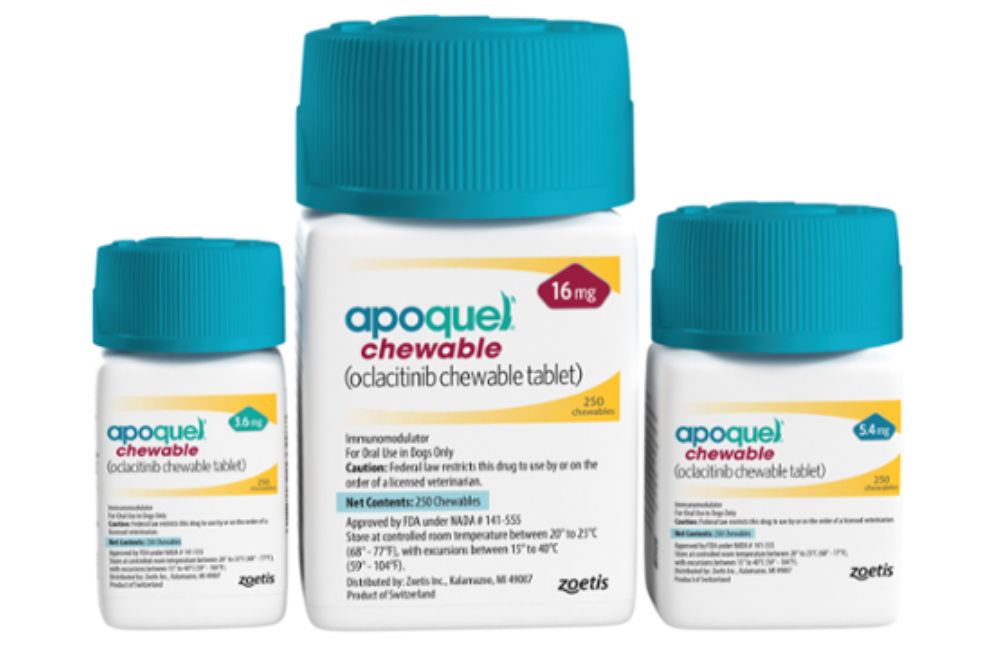7 Dog Allergy Medications Prescribed By Vets

All featured products are chosen at the discretion of the GreatPetCare editorial team and do not reflect a direct endorsement by the author or reviewer.
If you’re an allergy sufferer, you are probably well aware of the frustration and misery that allergies can cause. Given the impact that allergies have on our lives, it’s only natural to wonder about allergies in dogs. Do dogs develop allergies like we do? If so, can dog allergy medications provide relief?
Read on to learn about canine allergies, common symptoms, and the most effective treatments. We’ll cover popular dog allergy meds and vet-prescribed options to help manage dog allergies.
Popular Allergy Medicines for Dogs
Do Dogs Get Allergies?
Allergies are a relatively common problem in dogs, just like in humans. Dogs can be allergic to some of the same substances that trigger allergies in people.
Where we differ, though, is in the effects of common allergies. While humans tend to get a runny nose and watery eyes when we’re experiencing allergies, our canine companions tend to develop itchy skin and ear infections. These are often signs of allergic dermatitis or dog skin allergies.
There are three common triggers of skin allergies in dogs:
Environmental allergies: Like humans, dogs can become allergic to inhaled allergens, such as dust, dander, and the pollens produced by trees, weeds, and grasses. This condition is often called atopic dermatitis in dogs. Allergies to inhaled environmental allergens are estimated to affect 10-15 percent of dogs. Affected dogs often experience seasonal itching and inflammation of the skin.
Food allergies: An estimated 1-2 percent of dogs are affected by some form of food allergy. In these dogs, eating a particular food item will trigger an allergic reaction affecting the skin and ears. The most common food allergens in dogs include beef, chicken, eggs, and dairy. Food allergy symptoms may mimic environmental allergies, so diagnosis can take time.
Flea allergy: Fleas are a nuisance to any dog, but some dogs are especially sensitive to proteins found in the flea’s saliva. In these dogs, just one or two flea bites may be enough to trigger a widespread skin reaction. Fortunately, this is considered one of the easiest allergies to manage with consistent treatment. Regular use of flea prevention can help prevent signs of flea allergy dermatitis in dogs.
Each form of canine allergies requires a unique approach to diagnosis and treatment. After determining the underlying cause of your dog’s allergies, your veterinarian may prescribe dog allergy medications as a component of your dog’s short-term or long-term treatment.
Why Your Vet Might Recommend a Prescription Dog Allergy Medication
In a perfect world, we could prevent symptoms of allergies in our dogs by avoiding allergens. In reality, however, that isn’t always feasible. Food allergies and flea allergies may be preventable. However, there’s no way to completely protect your dog from pollen, dust, cat dander, or even human dander, all of which can serve as potential environmental allergens. Therefore, allergy medication for dogs often plays a role in treatment.
In some cases, dogs with very mild allergies may get relief from over-the-counter allergy medications like Benadryl or Zyrtec. Unfortunately, over-the-counter antihistamines for dogs are not very strong and may not provide significant allergy relief for many dogs.
That’s why veterinarians often recommend prescription allergy pills for dogs to help manage their allergies and make them more comfortable.
7 Prescription Dog Allergies Medications
Veterinarians use a variety of tools in the management of allergic dermatitis. Depending on your dog’s allergies, your dog skin allergy treatment plan may include:
- parasite preventatives
- prescription diets
- allergy shots for dogs
- medicated dog shampoo for skin allergies
- and other treatments
However, in many cases, prescription dog allergy medicine plays a leading role in the management of allergies.
Finding the right skin allergy medicine for dogs may take some trial and error. So it’s best to talk to your vet to determine which medication or combination is best based on your dog’s condition.
These seven allergy medications for dogs are commonly prescribed by veterinarians to manage allergy symptoms in dogs.
Apoquel


Introduced in 2014, Apoquel (oclacitinib) is a commonly-prescribed medication for dogs with allergies. Similar to Zenrelia, Apoquel works by blocking the production of cytokines, chemical signals that lead to itchy and inflamed skin. It comes in two formats: Apoquel tablets and Apoquel chewable tablets.
With Apoquel, dogs typically start on a twice-daily dose (to calm the allergic reaction). Then they taper to once-daily dosing for long-term maintenance.
This drug offers many of the benefits of other medications like prednisone/prednisolone and cyclosporine, with an even lower risk of side effects. In comparison to over-the-counter antihistamines for dogs like Zyrtec, Apoquel may be more effective at managing severe and chronic allergies in dogs.
Highlights
- Rapid onset
- Low risk of side effects
- Acts only on the skin – doesn’t suppress the immune system
Things to Consider
- Apoquel cost can be expensive, compared to other options
- No generic form available
- Follow Apoquel dosing chart for correct dosage and tapering
- Does not work for every pet (Apoquel alternatives may be necessary)
Zenrelia

Zenrelia (ilunocitinib tablets) is a new player in the canine dermatology market. Approved by the FDA in September 2024, Zenrelia is a once-daily medication for dogs with allergic and atopic dermatitis. It is a JAK inhibitor, which means it works by blocking the pathways that trigger allergic itch and inflammation.1 In a head-to-head study, 77 percent of Zenrelia-treated dogs achieved clinical remission from itching (pruritus) compared to 53 percent of dogs treated with Apoquel (oclacitinib tablet), the competitive JAK inhibitor.2*
Highlights
- Fast and effective relief, with visible improvements in allergic itch1
- Convenient once-daily dosing from the start (no tapering)
- Minimizes the risk of “rebound itch”2
- Cost effective
Things to Consider
- Dogs should not take Zenrelia for a time period before and after vaccination
- Dogs should be at least 12 months of age
Read the entire package insert before using Zenrelia, including the Boxed Warning.
Atopica

Atopica for dogs is available in capsule form. The active ingredient in this dog allergy medicine is cyclosporine, which was introduced as a treatment for dog allergies in 2003.
This drug was intended to offer the benefits of prednisone/prednisolone, with a lower risk of short-term and long-term side effects. In some cases, vets may prefer this med for long-term treatment of dog allergies.
Some dogs experience gastrointestinal side effects with cyclosporine, while nearly all dogs experience some level of side effects with prednisone/prednisolone.
Higlights
- Fewer side effects than prednisone and prednisolone
- Available for dogs 4 pounds and over
- Available in 15-count, 30-count, 45-count, and 60-count packages
Things to Consider
- Slower onset of relief than prednisone and prednisolone
- May suppress the immune system, especially at higher doses
- Dogs may experience gastrointestinal side effects (vomiting, diarrhea)
Cyclavance

Cyclavance is another cyclosporine option for treating allergies in dogs. Unlike Atopica, Cyclavance is an oral solution that can be given to dogs with a syringe. This could make dosing easier for dogs that have problems taking pills.
Cyclavance has the same benefits and side effects as Atopica, but it is a more affordable treatment option. It’s an appealing choice for pet parents looking for a budget-friendly dog allergy treatment.
Highlights
- Relatively inexpensive
- Liquid form may make dosing easier
Things to Consider
- Same cons (immune system suppression and GI side effects) as Atopica
Prednisone/Prednisolone

Prednisone and prednisolone have long been used to treat allergic reactions in a variety of species. These two closely related drugs (prednisone is metabolized to prednisolone in the body) suppress the immune system, effectively managing allergic reactions.
While these medications are highly effective, they can have a number of side effects. Veterinarians may use them for short-term relief in extremely itchy dogs. However, they are not typically recommended for long-term use.
Highlights
- Rapid onset of relief
- Effectively control itch and inflammation in almost every pet, especially at higher doses
Things to Consider
- Side effects are common: increased thirst/urination, panting, hunger, lethargy
- Suppress the immune system
- Long-term use associated with significant health issues, including skin disease, delayed wound healing, muscle weakness, urinary tract infections, fungal infections, diabetes, and Cushing’s disease
Hydroxyzine

Not every dog needs a strong medication like prednisone/prednisolone, cyclosporine, or Apoquel. In some cases, a dog antihistamine alone is sufficient to control itching.
Antihistamines for dogs work by counteracting the activity of histamine, an inflammatory chemical released in allergic reactions. Hydroxyzine is a commonly used, prescription-strength antihistamine in veterinary medicine. This drug is similar to Benadryl in its actions, but it can be more effective for many pets with mild to moderate allergies.
Highlights
- Rapid onset
- Low risk of side effects
- Inexpensive
Things to Consider
- Does not work for every pet
- Must be repeated every 6 – 8 hours
- May cause sedation
Clemastine

Like hydroxyzine, clemastine is a prescription-strength antihistamine for dogs. It’s more effective than Benadryl in many cases of canine allergies, but not as effective as more targeted medications. Still, many veterinarians recommend this medication in cases of mild skin allergies, due to its low cost and low risk of side effects.
Highlights
- Works quickly to reduce itching
- Low risk of side effects
- Inexpensive
Things to Consider
- Is not effective for every pet
- May cause sedation
There Is No Single Best Allergy Medication for Dogs with Itchy Skin
It’s important to note that there is no single best allergy medication for dogs. Instead, the best treatment for each individual dog will depend on factors specific to that pet. You may need to try more than one dog allergy med to find the right fit.
Dog Allergy Medications: Tips and Safety
Do not give any allergy medications to your dog without first consulting your veterinarian. Although some over-the-counter human allergy medications are safe for dogs, your veterinarian should have the final say. That’s because your vet is the best source for reliable information on dosing, side effects, and whether a given medication is appropriate for your pet.
Talk to your veterinarian before combining medications. In some cases, a dog may take over-the-counter medications, supplements, or even meds prescribed by another veterinarian.
In these situations, always make your veterinarian aware of this before beginning a new prescription medication. Allergy medications can interact with each other, leading to an increased risk of side effects. Do not combine medications unless instructed to do so by your (fully informed) veterinarian.
Follow your veterinarian’s instructions regarding dosing. If a given medication is not effective, do not increase your dog’s dose without first contacting your veterinarian. Overdosing your dog on allergy medication can have serious impacts. If a given medication at a given dose is not effective, that may mean that your dog needs a different medication. Never attempt to adjust dosages on your own.
Finally, oral medication alone is not effective for every allergy case. In many cases, your veterinarian may recommend additional treatments, such as parasite prevention, medicated allergy shampoo for dogs, a hypoallergenic diet, allergy testing, or adjunct treatments (such as long-acting injections) either alone or in addition to an oral medication.
Allergies in dogs are managed, not cured. Your dog will likely need lifelong treatment, unless you are somehow able to prevent all exposure to their allergens. By working closely with your vet, you can help your dog live more comfortably and reduce flare-ups over time.
References
1 Forster S, Boegel A, Despa S, et al. Comparative efficacy and safety of ilunocitinib and oclacitinib for the control of pruritus and associated skin lesions in dogs with atopic dermatitis. Veterinary Dermatology. 2025; 1–10.
2 Elanco Animal Health. Data on File.
*(P≤0.05).The primary study endpoint was non-inferiority at Day 28, with an optional continuation phase through Day 112. Additional endpoint P values are not adjusted for multiple testing; therefore, caution should be exercised in interpretation.









